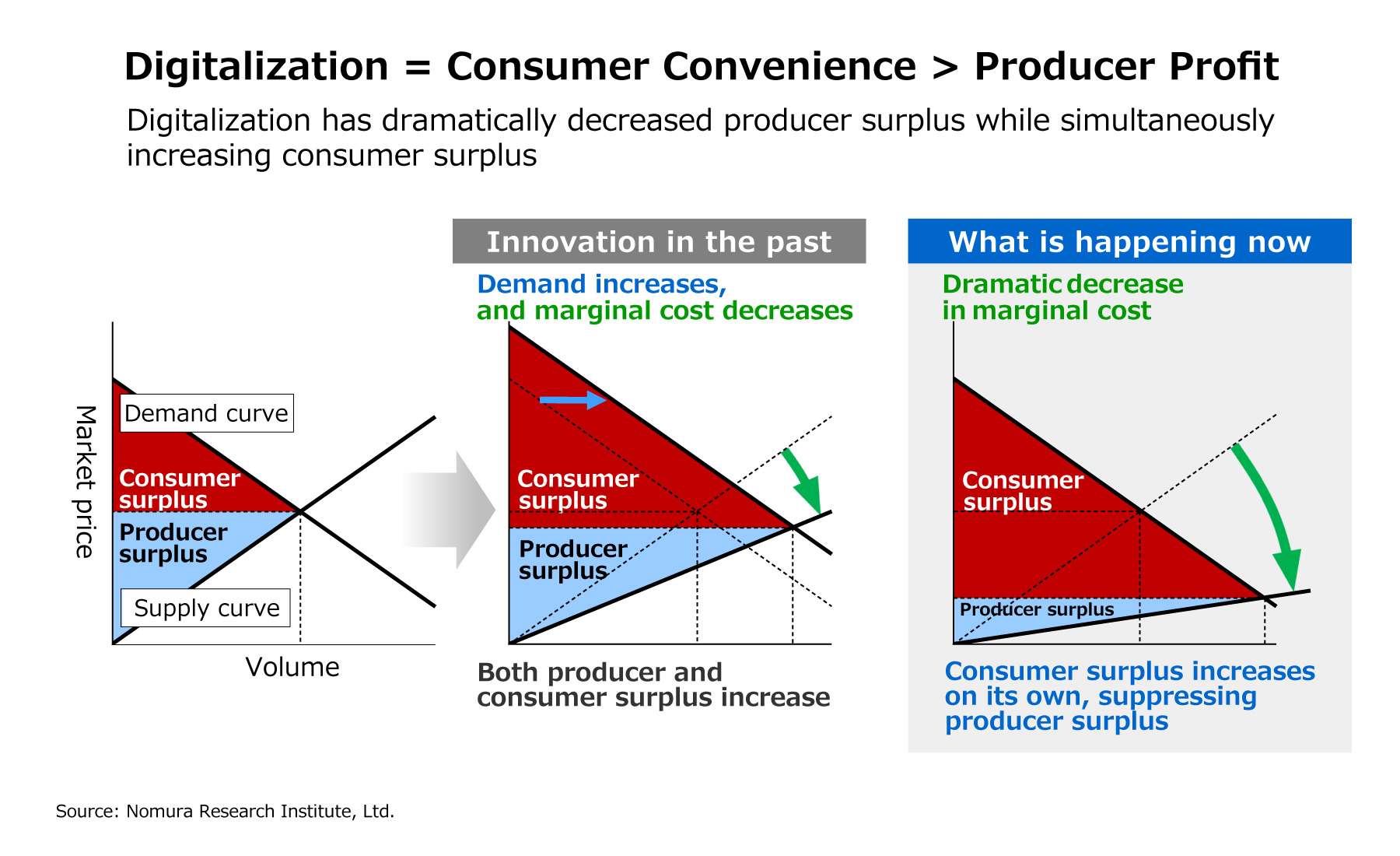Digital opening in the near future: NRI Dream Up the Future Forum 2017 (Part One)
#Management
#Innovation
Nov. 30, 2017
The NRI Dream Up the Future Forum 2017 was held on October 4, 2017. This forum, based on the NRI corporate philosophy of “dream up the future,” is an event that discusses the future of Japan and the world as a whole. This year, the theme was “Digital Opening in the Near Future.” Following a keynote speech by President and CEO Shingo Konomoto and a lecture by famous U.S. cultural critic Jeremy Rifkin, various professionals from the Nomura Research Institute, Ltd (NRI) came together for a multi-perspective discussion on social change as a result of digitalization.
Link to article on Part two
Digital opening in the near future: NRI Dream Up the Future Forum 2017 (Part two)
Digital changing Japan’s future: The impact of the sharing economy
Digital economies have been cropping up simultaneously in countries throughout the world. In this forum, we discussed how Japan and the world should adapt to these changes, and how best to use digital technologies to solve social issues and assist in the growth of Japanese companies.
The forum began with a keynote address by NRI President Shingo Konomoto, titled “Digital Changing Japan’s Future: The Impact of the Sharing Economy.”

Ever since the Lehman Shock, countries throughout the world have experienced a slowdown in their GDP growth, and the world economy has fallen into a long period of stagnation. Japan is no exception. Despite these facts, however, a survey by NRI has shown that, since around 2010, there has actually been a gradual increase in the number of people in Japan who feel that their living standards have improved. The reason, Konomoto stated, is an increase in consumer surplus, a statistic that is not shown in the GDP.

The progression of digitalization leads to decreased costs for things and services, and a consequent decrease in the prices that consumers pay for these things and services. In other words, consumer surplus is expanding, but producer surplus is shrinking, at a far greater pace than the increase in demand. If this excessive decrease in producer surplus continues, it is likely to have a negative impact on things like employee income and capital investment, and lead to the downward spiral of the economy. With this kind of future ahead of us, companies must be able to come up with new strategies that utilize digitalization to create new value. Konomoto places particular importance on the sharing economy, in which people work together to create, share, and manage things and services. Konomoto predicts that one possible result of digitalization is a restructured corporate world, one that is defined by platform giants that provide sharing services, companies with optimized manufacturing processes, and a variety of companies that provide unique services. This scenario would also mean the risk of platform giants gaining control over all kinds of big data, including personal information. In this era of the sharing economy, Konomoto said, it is necessary to establish a foundation (commons) for digitalization that allows individuals to manage their own data appropriately. He went on to say that establishing policies to encourage the construction of this commons is one option the government has to combat this issue. He raised the government-run online service “Maina Portal” as one concrete example.
Konomoto concluded his speech with the idea that Japan, with its lesser digital divide (inequality with respect to information access), is actually closer to the image of an ideal digital society than many countries in the West, and indicated the desire of NRI to contribute to the healthy and dynamic progression of the sharing economy.
Toward "smart Japan: The Third Industrial Revolution and the zero marginal cost society

Jeremy Rifkin, a critic of culture and economy well-versed in the sharing economy, spoke next. As main advisor for German Chancellor Merkel, Rifkin led the theoretical drive for Industrie 4.0. He explained, based on the content of his recently published book, The Zero Marginal Cost Society, how digital transformation and its advancement in the three fields of communication, energy, and transportation, have led to a Third Industrial Revolution* at the global level.
The advancement of IoT in our society has made it possible for the Internet, which was created originally as a communication tool, to connect to all kinds of things in all kinds of places—from our homes and offices to factories, shops, and public places where people gather. This allows us to fine-tune our controls over energy and transportation systems in ways that would not have been fathomable in the past. As more and more companies begin to take advantage of this kind of infrastructure, both society and the economy are undergoing dramatic changes.
Rifkin predicts that the era of IoT will bring with it the advent of a “zero marginal cost society,” one in which the efficiency and productivity of the economy will reach maximum levels. He expressed his wish that Japan, with its great potential, join Germany and China in leading the way for the Third Industrial Revolution, and that we realize a smart Japan that is able to adapt to the new economic paradigm.
*What Rifkin has proposed as the Third Industrial Revolution is the dramatic change in industry that results from the coming together of decentralized natural energy and the Internet age.







